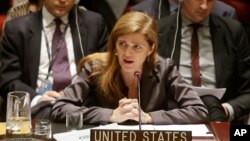It is still possible to reach a nuclear deal with Iran, but new U.S. congressional sanctions could seriously undermine prospects for an agreement and end up isolating Washington instead of Tehran, the U.S. envoy to the United Nations said on Monday.
The remarks from Ambassador Samantha Power were in a speech at the McConnell Center at the University of Louisville. Among those attending was the center's co-founder, Senator Mitch McConnell, the new U.S. Senate majority leader.
In her address, which was broadcast live on the Internet, Power called for greater cooperation between Republicans and President Barack Obama's Democrats on key foreign policy and security issues, including Iran, Cuba and the fight against terrorism.
“If we pull the trigger on new nuclear-related sanctions now, we will go from isolating Iran to potentially isolating ourselves,” she said.
Earlier on Monday U.S. Secretary of State John Kerry said that he and his Iranian counterpart would seek to push forward negotiations between major world powers and Tehran on its nuclear program.
Kerry meets Iran's Foreign Minister Mohammad Javad Zarif in Geneva on Wednesday to renew the push for an elusive nuclear accord after negotiators failed for the second time in November to meet a self-imposed deadline. The agreement would gradually end sanctions in exchange for curbs on Iranian atomic work.
“Some members of Congress believe that the time has come to ratchet up sanctions on Iran,” she said. “They argue that this is the most effective way to achieve the goal of getting Iran to give up its nuclear program.”
“We in the administration believe that, at this time, increasing sanctions would dramatically undermine our efforts to reach this shared goal,” she added.
Despite tremendous differences between Iran and the international community on issues like the future scope of Tehran's uranium enrichment program and the duration of any restrictions on Iranian atomic activity, Power said a long-term accord was still possible.
“We are still at the negotiating table for one reason, and one reason alone,” she said. “We assess that we still have a credible chance of reaching the agreement we want.”
The moment the Obama administration decides it is not possible to reach a deal with Tehran, she noted, it will join Congress in pushing for new sanctions.
“We have not reached that point yet,” Power said.
Senior foreign ministry officials from Iran and six world powers - the United States, Britain, France, Germany, Russia and China - resume nuclear talks on Sunday to hammer out an agreement by their new June 30 deadline.







